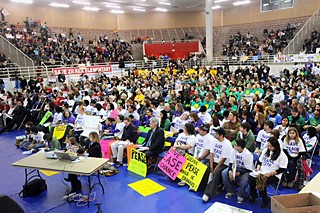A Mission To Communicate
AISD's new outreach director has a big job ahead: telling the district's story and getting the district to listen to the response
By Richard Whittaker, Fri., Nov. 11, 2011
For a young man, the Austin Independent School District's Director of Public Relations & Multicultural Outreach Alex Sanchez has already had a varied career. Since 2004 he has crafted PR strategies for pharma giant Pfizer, taken a shot at the Colorado state Senate, and held two senior positions with the Denver Public Schools.
Perhaps surprisingly, Denver schools have a lot in common with AISD. Both are large urban districts, enrolling around 80,000 students; both are majority-minority, with nearly 60% Hispanic students; and both have large groups of English-language learners and a large poor population. But after a lifetime in the Rocky Mountains, Sanchez is now acclimating to Austin's peculiar and storied educational culture. He said, "Just as there is a student achievement gap, there is a communications gap, there is an engagement gap."
His new Department of Public Relations & Multicultural Outreach is one of the most significant structural changes to district operations since Superintendent Meria Carstarphen took over in 2009. When Sanchez formally joined the district on July 1, he took on the leadership of an idea of a department. On one side will be the traditional press office, and on the other, there's community and family outreach. A year ago, there were two separate offices: Planning and Community Relations under Executive Director Janis Guerrero and Communication Services under Director Andy Welch. Two years later, Guerrero (who died earlier this year) and Welch (who took retirement) are both gone, and in their stead is Sanchez's new combined shop.
This restructuring was a deliberate decision. When Carstarphen launched her "reduction in force," or RIF, in November 2010, it was sold as a necessary cost-saving exercise. However, 88 of the 1,153 positions she asked the board of trustees for permission to cut were actually part of an administrative reorganization. Of those 88, eight were from the press desk – all in the name of freeing up cash to create a new department.
In theory, the idea was to debalkanize those offices and their functions and create a cohesive, coherent agency that can both speak more clearly and listen better. While Sanchez said he's aiming for better press relations, he said, "Your weekly publication or the daily here in town should not be the employee newsletter." Instead, he wants to overhaul everything – from better staff email newsletters to more community meetings. Sanchez said, "Our intent is to increase the number of messages about school, about school reform, about the urgency of being an engaged parent."
The structure of the office remains in flux. When it was first proposed in March of this year, the organizational chart showed 19 positions for the 2011-2012 school year. As of mid-October, there were 14 filled positions, but there's also been turnover: Since the beginning of the school year, at least two members of Sanchez's shop – including Roxanne Evans, the last survivor of the old press office – have quit the district. By late October, there were seven positions still being advertised, including two assistant directorships – one for Communications and one for Community Engagement & Multicultural Outreach. Neither of those positions appeared on the original chart, and both come with hefty price tags: up to $95,000 in salaries each, plus benefits. Explaining the changes, Sanchez said his first month on the job had been about filling existing vacancies and then looking for gaps. "I made my recommendations to the administration in terms of the right structure, and we're in year one of that," he said. "We've been able to restructure the shop; we've been able to re-evaluate the vacancies, change those vacancies to fit the new structure."
Ambition and Reality
The design of the new department will be driven in part by its expanded mission, in part by the old troubles of language barriers and the digital divide, and in part by the toolbox Sanchez wants to use. Some of it is simple and obvious ("We know that the backpacks of kids are the best dissemination channels," Sanchez said), but some of it may take some invention. One reason the district hired him was because of his innovative approach to using local media. In Denver he hosted Educa, a weekly one-hour Spanish-language radio show paid for by Denver Public Schools and carried by three of the city's largest Spanish-language commercial stations. From a Latino community engagement perspective, it was an obvious choice. Sanchez said, "We know that Spanish-dominant adults listen to the radio on average seven hours a day." In Denver, those stations were the Top 3 in the ratings, while in Austin the biggest Spanish station is only No. 7, but Sanchez still sees this as an exciting new avenue for outreach. "Whereas you and I might tune in going to and from work – drive time – the average Spanish-dominant adult listens throughout the day."
However, whether it be more tweets or more multilingual publications, the goal remains the same: more parents and more stakeholders who know what's going on in the district and in their local schools. For his department to work, Sanchez says, it cannot be operating in a bubble. "It takes hiring communicators, not just hiring interpreters," he said. "In the short term, you can do interpretation and translation, but the long-term strategy needs to be getting into a place where you're able to recruit and retain that talent that can engage, communicate, run schools, teach, and all that good stuff." That may be a bigger challenge than it sounds. While 27.4% of AISD's student population is classified as having limited English proficiency, many students cannot speak Spanish well either. The district encompasses a growing Asian population, as well as migrants, immigrants, and refugees from around the world, meaning Sanchez's office cannot simply print fliers in English and Spanish then presume its job is done. He said: "If the system is not prepared to engage a Vietnamese-dominant parent, and if the system is not able to ensure that parent has a successful experience and is really able to participate, then that's where you're going to get into the challenges. Because we're frustrating that parent, and we've probably lost that parent."
The plan indeed sounds ambitious and idealistic. Moreover, during this year's reduction in force, the district has cut back dramatically on frontline contacts by shedding 44 campus-based parent support specialists and coordinators. They specialized in the kind of face-to-face engagement that Sanchez's shop now has to take on. There are only 56 specialists left – significantly more than the 12 he had in Denver – but if schools are to emphasize community engagement and outreach, then even the pre-RIF numbers would not have been enough. Sanchez said: "I would like to see every school have a peer person, a community engagement person, a parent-support specialist, and probably a resource advocate, someone whose whole job is to get businesses and nonprofits to help all those kids with all their needs outside of what they need to learn. Housing, shelter, food, social emotional needs, all that other stuff. But the reality is that, given Texas' budget challenges and given Austin's budget challenges, that may not be a reality."
The press and outreach budget has been a particular public sore point, especially when there have been big district checks cut to external consultants. Take the open wound that was the Facility Master Plan Task Force process: AISD paid Ohio-based consultants DeJong-Richter $893,796 to run the community outreach section of the process, plus an extra $37,642 to local PR firm Hahn, Texas. What it got for its money was a major black eye and a furious community. For the moment, Sanchez expects outside PR firms to remain important in projects like bond elections, but he offered his own "two cents on consultants. There's a place and a time for an agency to come in and help you with strategy, or to help with short-term projects. In my business, I typically look at them not necessarily as consultants but independent contractors." For example, in Denver he produced newsletters in Arabic but could not justify hiring a full-time Arabic specialist. Instead, he turned to freelancers. He said: "It's three times a year; you get into a contract, and that's cost-effective for me. But anything that's costing me more than a full-time employee, I have to say, 'Gosh, could I get that plus more if we were to invest those dollars internally to increase our own capacity?'"
Is Anybody Listening?
So how will anyone know if Sanchez's new department is doing a good job? For Place 9 trustee Tamala Barksdale, the key is what she called reaching "often unreached populations." As vice president of EnviroMedia Social Marketing, her run for the board played strongly on her professional experience in PR and creating messages. She said, "With a robust multicultural outreach program ... it's about making sure you're checking all the boxes and making sure all the stakeholders feel included." While Barksdale said she is not tracking the structural or staffing changes within the department, she is keeping a weather eye on the office's effectiveness. She said she already saw one positive sign – more publications in Spanish – but added that she's more interested in results than the tools for achieving them. Her metric for the department's success will be very simple: how many parents, families, and stakeholders turn up for meetings. Again, another positive sign: About 300 people attended each of the first two on-campus meetings about the superintendent's annual facility recommendations. "Turnout at these in-district meetings was far beyond what I would have expected," she said.
That should be good news for Sanchez, because he will need trustee support as he retools and readjusts his department. Members of the board have already said they'll be scrutinizing the number and cost of any new positions to see if they are really getting value for money. After all, they laid off several long-term and popular employees to enable the creation of this new shop; it had better be worth it. Barksdale said she will happily approve the Public Relations & Multicultural Outreach hiring budget "if these new positions can help reach out to people, especially with less parental support on campus."
Justifying high salaries like those assistant directorships shortly after massive teacher layoffs is undoubtedly a tough sell. Yet Sanchez argued that even with every position filled, compared with other districts, his office might be understaffed. "Have you looked at Dallas? They have about 72 people," he said. "Operating budget? Five million dollars, and that's to do publications. How many marketing people do you think they have in Dallas, just to roll out publications? Thirty-six. How many marketing people do I have? Zero, and I'm not even proposing a marketing position." Similarly, Sanchez's office will be dwarfed by the city of Austin's PR and community outreach machines. He said: "What cities do is that they embed public affairs people. But if you were to take all of those functions and put them all in one, you will see their structure. But because they embed them into these agencies, it's not reflected in the Mayor's Office."
Finding a Narrative
However, while Sanchez tries to expand his contact list, he must still address the groups and individuals already at the table. He has frankly inherited a lot of bad blood, as the days of the media being what former Superintendent Pat Forgione dubbed "critical friends" to the district are gone, or at least in suspension. Carstarphen's initially friendly relationship with the local press corps has degraded fast, and journalists from outside of Austin who dealt with her in St. Paul, Minn., and Washington, D.C., report they went through the same experience: a brief honeymoon period, then an increasingly combative and insular attitude from her administration.
The changes have been subtle but carry a serious impact on news gathering. Response times for press requests have slowed, and more members of the administration have become unavailable for interviews, or else those interviews have been shortened or held under restricted circumstances. Press department staff have been increasingly sidelined as requests for information are either focused through the superintendent's office or simply reclassified and redirected as "open records" requests – which, again, go through the superintendent's office. Quickly returned phone calls on standard information have become 10-day waits for formal requests to be processed. Meanwhile, Sanchez's staff have been burning daylight on a flurry of feel-good press releases, rather than answering press queries. The result is a tense relationship, expressed most publicly through increasingly critical Austin American-Statesman editorials and the blow-up over Carstarphen's attempt to embargo information about the Facility Master Plan (see "AISD: Open Embargo, Find Plan," Sept. 30).
So the press corps and the local PR industry will be watching closely to see whether Sanchez changes that culture. Through both his old company Adelánte Solutions and his new PR firm Brisa Communications, Paul Saldaña has become one of the most consistent professional voices for the Hispanic population and a regular contractor with AISD. He described the district as having been in "a crisis mode. ... They're trying to respond to all the fires that are developing, from the budget to the Facilit[y] Master Plan to the East Austin schools." As a contracting professional, he notes that his and other PR firms have been to Sanchez's office to work on quick turnaround projects; as a schools advocate, he's paying closest attention to permanent hires.
So far, Saldaña said, there seems to be a dearth of staff with real local knowledge. In some ways, the situation is reminiscent of the baptism by fire that Carstarphen faced when she arrived in Austin. She stepped straight into a fight with state Commissioner of Education Robert Scott over Pearce Middle School when she was still trying to come to grips with Texas' mercurial accountability and school finance systems, while also fulfilling her extensive meet-and-greet obligations. The board has defended the practice of out-of-town and out-of-state hires as bringing in fresh blood and fresh ideas, but, Saldaña said: "To me what is more important is the social-capital aspects of the relationships that have been formed with both the community and the press. To me, I would think that would take precedence over anything else." What has surprised him most is not who has been hired, but the number of seasoned local PR professionals and community organizers he knows who applied for vacancies under Sanchez but are not even getting interviews. He said, "People are questioning, well, if they're trying to hire grassroots communications people, the people who are applying who you would think that they would want to hire or maybe consider are not even getting those jobs."
Saldaña's other concern is that the new policy of outreach should not become just set-dressing. Take the ongoing round of campus talks relating to Carstarphen's annual facility recommendations. Saldaña said: "The perception out there is that they're scheduling these meetings right through the holidays. People don't feel that they're going to be well-attended, that they're going to be rushed – but it's an attempt to quantify that they were inclusive and there was outreach in the community." He argues that the culture of "listening without listening" starts at the top – that Carstarphen is "not an active listener" but instead uses meetings as a platform to explain what she is going to do. He warned, "If you're going to have this old, bureaucratic approach ... where the government is going to dictate to the community, it's not going to work."
That fear of community outreach as set-dressing is something that Jason Sabo will also be watching. As co-founder of Frontera Strategy and a public schools activist, Sabo spends much of his time traveling around the state, talking to education groups about how to become effectively engaged with their school districts. He turned those skills directly on AISD when he found that his children's school, Barton Hills Elementary, was one of the campuses listed for potential closure in the earliest version of the Facility Master Plan (see "What the Task Force Wrought," May 27). When it comes to reaching parents who are not yet engaged, he said, "I think their heart's in the right place," but it's too early to say whether that will be enough.
For Sabo, the question is not just the quality or quantity of the messages, and he echoed Saldaña's concern that the district too often sees community outreach as a one-way street. That can be dangerous in the current climate, as parents are still bruised and suspicious after they derailed – for the present – the school-closure plans. Sabo said: "The district is going about it backwards. They know what they want, and they're going out into the community trying to sell it, like it's a new pair of socks." It is not just the administration that needs to improve; Sabo has been part of a growing chorus that has criticized how the board accepts public comment at its meetings. "As long as they're forcing people's comments down to two minutes at Citizens Communication," he said, "they're never going to get the kind of genuine dialogue they need."
While Sanchez's shop is trying to get parents involved and informed about the district, they will still have to fight the same old PR wars. For Sabo, that may be where the most immediate challenges lie, especially since the board has been so squeamish about land-mine issues like boundary redrawing and property tax rollback elections. He said: "AISD, like it or not, in the not too distant future is going to have to approach this community and ask it to support tough choices and a new bond or tax rate. The reality is that unless there is a very conscious effort to ensure that the people of Austin and the district understand what they are attempting to do, they will be unsuccessful."
Any tax or bond election will first involve persuading the Austin Chamber of Commerce. Traditionally, the chamber has backed bonds, but last year its opposition kept a potential tax rollback election off the ballot (see "Bowing to Business Wheels, AISD Cans Tax Hike," Aug. 27, 2010). Drew Scheberle, the chamber's senior vice president of education and talent development, was very positive about Sanchez and his résumé, but thus far, he said, "I don't really have a clear sense of what they're trying to achieve yet." The question Scheberle asks of the district is the same one he poses every year in the chamber's education progress report: "If somebody in the community is only going to spend an hour all year thinking about the school district, what do you want them to know about what you're trying to accomplish?" While most districts are pretty good at dealing with the press, Scheberle says, they are weak at both internal and external communications with stakeholders. He believes what is lacking currently is a "meta-narrative to the community about what the school district is trying to accomplish, what role they need parents to play and the kids to play and the community and tax payers. I think part of it is they don't have" a narrative.
The Facility Master Plan is an object lesson in that lack of clarity. The board requested a definitive 10-year strategic vision, but when the project became politically contentious, they shifted to Carstarphen's newly adopted approach of annual facility reviews: all tactics, no long-term strategy. If Sanchez's office is eventually to be judged a success or a failure, that may become the real metric: not day-by-day communication, not the number of people at big meetings, or even how many translators they hire for how many languages. Instead, it will just be whether those traditionally underreached and unengaged communities know what is happening and engage with the district accordingly. Sanchez said, "We have to improve; we have to be able to build in systems that allow us to communicate with those families and those kids."
Got something to say on the subject? Send a letter to the editor.















